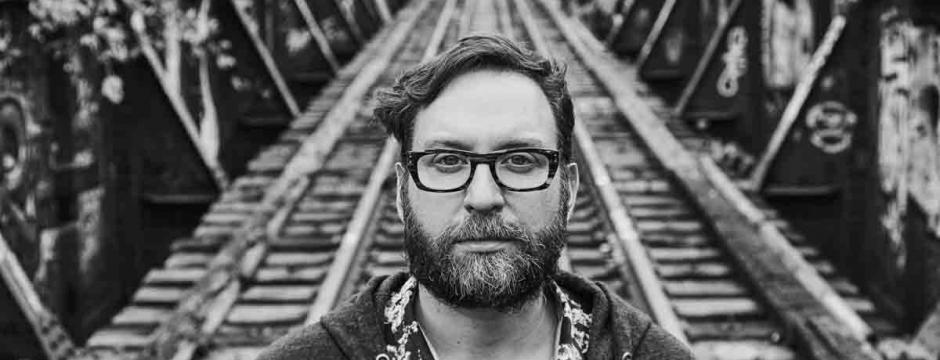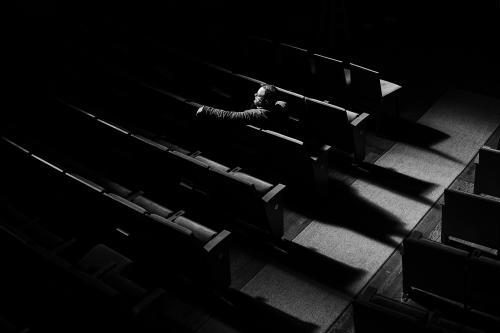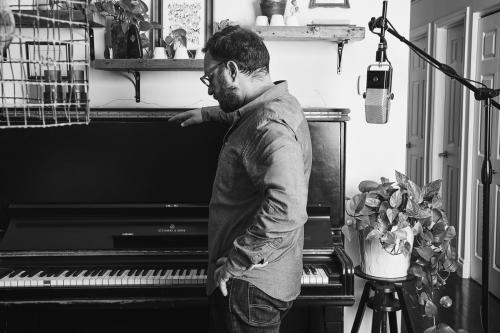Band: R Grunwald
Album: Oma
VÖ: 26.04.2020
Label/Vertrieb: Outside Music / Bertus Musikvertrieb GmbH
Website: https://rgrunwald.com/
R Grunwald has played on sessions for hundreds of musicians. The Toronto keyboardist has been faithful to two different singer-songwriters, jazz/pop chanteuse Jill Barber and country/folk songwriter Donovan Woods, for the better part of a decade. He’s played with New York City’s Three Famed Cantors, and scored film and TV shows (including the award-winning Yid Life Crisis—“It’s basically Curb Your Enthusiasm, but set in Montreal and in Yiddish,” he says.)
Now he’s ready to step onto the public stage with his own music—alone. But there’s one person who will be with him every night he performs, though she won’t be there physically. His 96-year-old grandmother, who has lived in Chile after fleeing her native Poland in 1946, is the primary inspiration for Grunwald’s first solo album. It’s called Oma—which is the German word for “grandmother.”
Grunwald started piano lessons in Canada when he was 6. His teacher was a strict Russian woman whose edicts frustrated the boy enough that one day he leaned back on his piano stool, anchored his feet on the keyboard and announced, “I quit!” His mother started gathering their things. The teacher admonished her for caving in to the petulant child. That Christmas season, when Grunwald’s family went to Chile to visit his paternal grandparents, his oma was concerned that the youngster was giving up so easily. So she gathered family and friends for a day of piano music, including a four-hand duet with Grunwald’s uncle. The boy was smitten. On the plane ride home, he told his mother he wanted to play again.
Decades later, Grunwald found himself at the Banff Centre for Creative Arts, nestled in the Rocky Mountains of Alberta. He was there in January 2017 to compose music for solo piano, inspired by ambient music he’d been making with friends. He’d already recorded one piece, “Fountain,” for a 2016 compilation called Slow Music Vol. 1 (featuring Christine Bougie, Sarah Slean, Felicity Williams and others). Whenever he would get stuck, he would think about his grandmother and the music she loved: Chopin, Lizst, Satie, “a lot of late classical and early Romantic composers,” he says. “That music is really deep inside of me because of her.”
Grunwald was also inspired by a wave of solo piano music in recent years, including favourites of his like Nils Frahm, Chilly Gonzales, and Max Richter. “I would never have considered doing this project five years ago,” he says. “Who’s going to listen to solo piano? Especially the kind of music I write, which is very slow and cerebral and takes a lot of attention.” He admits, though, that there is now a glut in the genre, and he hopes to stand apart. “When I look under the category ‘solo piano’ on streaming services, I go through the list, and 90% of it sounds exactly the same: arpeggios, not very melodic. What’s different about my music is that it’s intensely focused on melody. It’s not pop music, but it has something to latch on to. I’m a session guy, so the one thing I know more than anything is that melody is king, and you shouldn’t get in the way of that.”
His family’s history was on his mind while he was composing, but there’s a whole other history he was in touch with while recording. The grand piano on which the album was recorded now sits at Toronto studio Union Sound Company, but for years was located at the city’s legendary Montreal Bistro, where many live recordings were made; everyone from Oscar Peterson to Diana Krall played at some point. “People know this piano; it’s famous,” says Grunwald. “There was actually an album made where they got all the top Canadian jazz pianists of the ’90s to perform on it as a tribute to the instrument itself.”
This isn’t jazz, though. Grunwald refers to the compositions on Oma as “extended minimalism.” He explains, “It’s taking from the tradition of Philip Glass and Steve Reich, but in all that music the motifs are short and develop through repetition. I wanted to expand that, using motifs that form complete melodies, and have those evolve through different textures or harmony.” The album’s creation was also extended: two years between composition and mastering of the final recording, and almost another year before the album was ready to release. No need to rush slow music.
Grunwald’s favourite track on the record is “Age.” “It represents a life cycle of a human,” he says. “It starts gently and delicate like childhood and youth… then it gets more complex and heavy as life move on, and by the end it goes back to frailty. That song makes me think of my grandmother’s life.” When the album was mastered, Grunwald went to Chile to play it for her, and also to record her incredible life story for posterity. While there, he and his partner learned they were about to have their first child. Now that both the album and the child have arrived, Oma plays as much more than just another meditative solo piano record. Though they might sound like lullabies, these bedtime stories belie their sparse simplicity.



